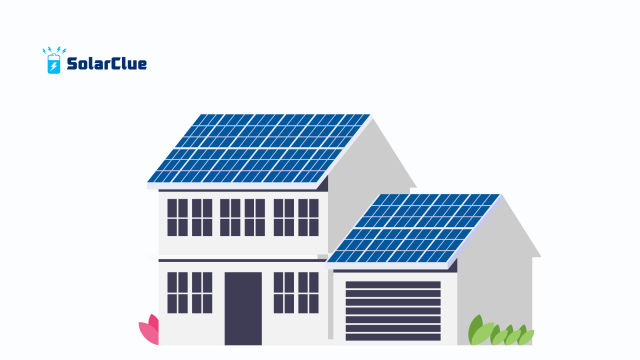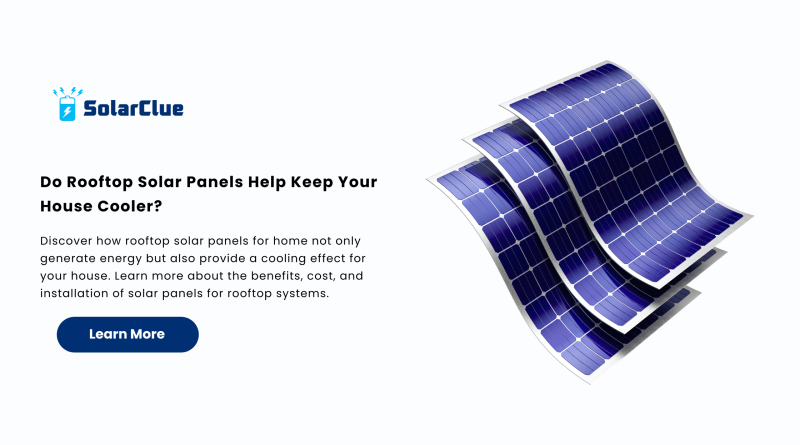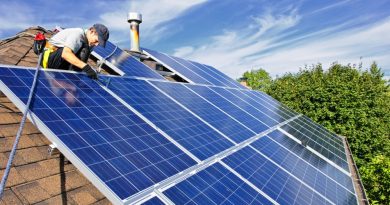Do Rooftop Solar Panels Help Keep Your House Cooler?
In recent years, the popularity of solar panels for rooftop installations has soared, not just for environmental reasons or saving on electricity bills, but also for a surprising benefit—helping to keep homes cooler. If you’ve ever wondered, “Do solar panels reduce house heat?”, the answer is yes. Let’s break down how this works and why this unexpected perk adds even more value to install solar panels on roof.
Table of Contents
- 1 How Solar Panels Reduce Heat Absorption
- 2 The Science Behind the Cooling Effect
- 3 Benefits Beyond Energy Generation
- 4 Real-World Data on Cooling Impact
- 5 What Is the Cost of Solar Rooftop Systems?
- 6 Installing Solar Panels: What to Consider
- 7 Long-Term Savings and ROI
- 8 Environmental Impact
- 9 Maintenance and Durability
- 10 Are Solar Panels Worth It?
- 11 Conclusion
- 12 FAQs
How Solar Panels Reduce Heat Absorption
Rooftop solar panels act like a shield for your home. When the sun beats down on a typical roof, a large amount of solar radiation is absorbed by the roofing material, transferring heat into your attic and eventually into your living spaces. However, solar panels cooling effect is real and measurable.
Studies conducted by the University of California San Diego revealed that homes with rooftop solar panels had their roof temperatures reduced by up to 5°C (about 9°F). This can translate into a reduction of indoor temperatures and decreased cooling costs in summer.
The Science Behind the Cooling Effect
The cooling effect happens because the panels block and absorb sunlight that would otherwise heat the roof directly. Additionally, the air gap between the panels and the roof provides passive ventilation, allowing heat to dissipate instead of being trapped.
Moreover, the solar panel surface is designed to absorb solar radiation and convert it into electricity, thus preventing some of that energy from being converted into heat.
Benefits Beyond Energy Generation
While the primary function of a solar panel is to generate clean energy, this added benefit of thermal insulation can be a game-changer, especially in hot climates. Lower roof temperatures can:
- Decrease your reliance on air conditioning
- Extend the lifespan of your roofing material
- Improve overall home comfort
All of this makes solar panels for rooftop not only a wise financial investment but also a smart environmental decision.
Real-World Data on Cooling Impact
According to a report by the National Renewable Energy Laboratory (NREL), homeowners could see a reduction of up to 38% in the heat that enters the building through the roof when they install solar panels on roof.
In areas with high solar radiation, such as India or the southwestern U.S., this effect is even more pronounced. Cities like Bengaluru, Chennai, and Hyderabad are seeing growing interest in rooftop solar panels for home partly because of this advantage.
What Is the Cost of Solar Rooftop Systems?
The cost of solar rooftop systems depends on several factors:
- Size of the installation (in kilowatts)
- Type of solar panels (monocrystalline, polycrystalline, thin-film)
- Brand and quality
- Installation charges
- Government subsidies and incentives
On average, in India, the cost of solar rooftop installations can range from INR 45,000 to INR 60,000 per kW. With subsidies, this cost can reduce significantly, sometimes by up to 40%.
Visit SolarClue.com to get real-time estimates and available subsidies in your region.
Installing Solar Panels: What to Consider

Before you install solar panels on roof, consider the following:
- Roof orientation and tilt: South-facing roofs generally receive the most sunlight.
- Shading: Ensure no trees or buildings block the sun.
- Roof condition: It’s best to install panels on a sturdy, damage-free roof.
- Load-bearing capacity: Ensure your roof can support the weight of the solar array.
Proper installation ensures maximum efficiency and enhances the solar panels cooling effect.
Long-Term Savings and ROI
Not only do you save on electricity bills, but the reduced cooling costs also contribute to your overall savings. Over 20-25 years, the typical lifespan of a solar panel, the ROI is substantial.
Plus, governments around the world are providing tax credits, rebates, and net metering policies to encourage homeowners to switch to rooftop solar panels for home.
Environmental Impact
Beyond savings, you contribute to reducing greenhouse gas emissions, lowering your carbon footprint, and promoting sustainable living. Every kilowatt-hour of solar energy offsets harmful emissions from fossil fuels.
Maintenance and Durability
Most solar panel systems require minimal maintenance. Occasional cleaning and annual inspections are sufficient. Panels are built to withstand harsh weather—rain, wind, hail, and high temperatures.
Are Solar Panels Worth It?
Absolutely. With dual benefits of energy generation and passive cooling, solar panels for rooftop installation offer unmatched value. They increase property value, reduce utility bills, and improve indoor comfort.
Visit blog.solarclue.com for in-depth articles, buyer guides, and expert advice on solar adoption in your area.
Conclusion
So, do solar panels reduce house heat? Yes, they do—and effectively so. With growing temperatures and rising energy costs, there’s never been a better time to install solar panels on roof. The added solar panels cooling effect is just another reason to consider going solar today.
To learn more or to request a personalized solar quote, visit our website and explore the sun-powered possibilities at SolarClue.com – your home deserves a cooler, smarter future.
FAQs
1. Do solar panels really cool down my house?
Yes, solar panels can reduce roof temperatures by blocking sunlight and allowing air circulation, which indirectly keeps your house cooler.
2. Is the cost of solar rooftop worth it for the cooling benefit alone?
While the primary ROI comes from energy savings, the cooling benefit adds extra savings in reduced air-conditioning costs, especially in hotter regions.
3. How much does it cost to install rooftop solar panels for home in India?
It ranges from INR 45,000 to INR 60,000 per kW before subsidies, which can reduce costs significantly.
4. Can I install solar panels on any type of roof?
Most types, including RCC, metal, and tiled roofs are suitable, provided they are structurally sound and receive good sunlight.
5. How long do solar panels last?
Most panels come with a warranty of 25 years and can continue functioning efficiently beyond that with minimal maintenance.



